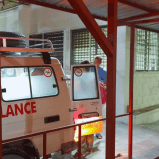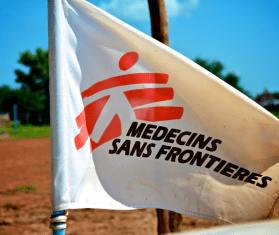PORT-AU-PRINCE, November 19, 2024 — A series of threats by Haitian police forces against Doctors Without Borders/Médecins Sans Frontières (MSF) staff have forced the organization to suspend its activities until further notice in the metropolitan area of Port-au-Prince, Haiti. In the past week, police officers have stopped MSF vehicles multiple times and directly threatened MSF staff members, including by threatening death and rape.
This follows an attack on an MSF ambulance that resulted in the execution of at least two patients and physical harm to our staff on November 11. These repeated incidents have compelled MSF to stop patient admissions and transfers to its five medical facilities in Haiti’s capital on November 20, as they clearly illustrate the direct targeting of our personnel and patients in Haiti.
“As MSF, we accept working in conditions of insecurity, but when even law enforcement becomes a direct threat, we have no choice but to suspend admissions of patients in Port-au-Prince until the conditions are met for us to resume,” said Christophe Garnier, MSF head of mission in Haiti. “Every day that we cannot resume activities is a tragedy, as we are one of the few providers of a wide range of medical services that have remained open during this extremely difficult year. However, we can no longer continue operating in an environment where our staff is at risk of being attacked, raped, or even killed!”
After the attack on November 11, MSF has faced four other threatening encounters in only a week. This series of incidents have left us with no choice but to suspend our activities in Port-au-Prince:
- On November 12, two MSF ambulances were stopped by officers of the Haitian National Police’s Brigade de Recherche et D’Intervention (BRI), who threatened to kill MSF staff in the near future.
- On November 16, in Delmas 33, one of our drivers was verbally assaulted by plainclothes police officers who warned us of future attacks on our ambulances.
- On November 17, shortly before midnight, another MSF ambulance transporting a patient was stopped near Boulevard Toussaint Louverture by a SWAT team who threatened to kill the patient on the spot. After intense negotiations, the ambulance was allowed to continue its journey to the MSF hospital in Tabarre.
- On November 18, in Carrefour Rita, a Haitian National Police vehicle driven by a plainclothes policeman armed with a pistol stopped an MSF vehicle taking staff to the workplace. He threatened the MSF staff members onboard, saying that next week police forces would start executing and burning our staff, patients, and ambulances.
There have also been attacks on multiple occasions on MSF ambulances and personnel by armed vigilantes, including on November 11.
Haiti: After a gruesome attack, MSF suspends activities
MSF provides care to everyone on the basis of medical needs alone. Each week on average in the Port-au-Prince metropolitan area, MSF provides care to more than 1,100 patients on an outpatient basis, 54 children with emergency conditions, and more than 80 new survivors of sexual and gender-based violence. MSF is suspending all medical services except to already hospitalized patients at its five medical facilities and its mobile clinics in the Port-au-Prince metropolitan area, who will continue to be in MSF’s care. Our maternal health activities in the south of the country, in Port-a-Piment will also continue.

Haiti: MSF ambulance attacked by police, patients executed
Read more“We have been in Haiti for more than 30 years, and this decision is taken with a heavy heart. Healthcare services have never been so limited for people in Haiti," Garnier said. "Many people will lose access to MSF services because we are not able to work safely in Port-au-Prince. We remain committed to people in Haiti but cannot resume admissions of new patients to our facilities in Port-au-Prince unless we are guaranteed unhindered security and respect for our medical and humanitarian mandate by armed groups, members of vigilante groups, and law enforcement officers.”




